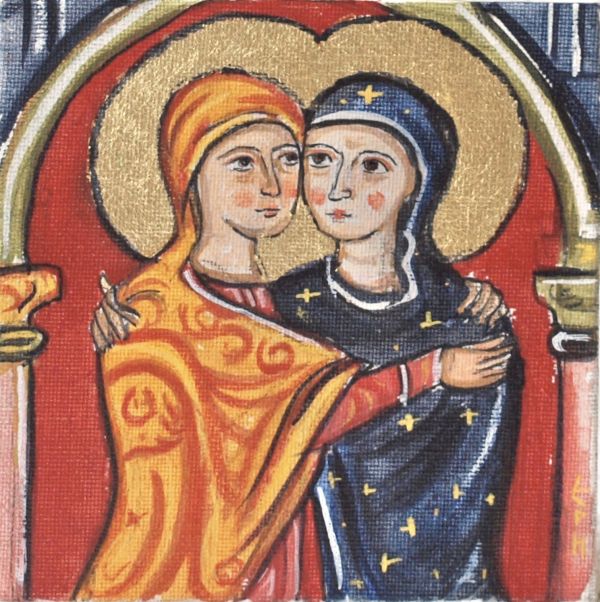The passage from Luke proposed by the Liturgy today presents the visit of Mary, Mother of Jesus, to her cousin Elizabeth. Both are awaiting the birth of their son, whom they carry in their wombs. An expectation comforted by a gasp of joy in Elizabeth's womb and the hymn of the Magnificat on Mary's lips.
It is a splendid encounter that testifies to the great works of God in those who believe in Him.
Francis and Clare lived their encounter and that with every creature as a Visitation of Grace to them, rejoicing and being moved by the beauty of the divine work.
There are passages in the Sources that hint at this.
It is enough to glance at Clare's Letters to her spiritual daughter, Agnes of Bohemia, to realise how, although distant from each other, they rejoiced in the wonders God worked in them, communicating them to each other.
"To the venerable and most holy virgin, Donna Agnes, daughter of the exalted and most illustrious King of Bohemia, Clare, unworthy servant of Jesus Christ and useless handmaiden of the women recluses of the monastery of San Damiano, his subject in all things and servant [...] wish you to attain the glory of eternal happiness" (FF 2859 - Letter prima).
"Mindful of your purpose, like another Rachel, always keep the starting point before your eyes. The results you have achieved, keep them; what you do, do well; do not stop; but on the contrary, with a swift and light step, with a sure footing, that not even the dust may retard your progress, cautiously advance confidently, joyfully and solicitously along the path of beatitude" (FF 2875 - Letter II).
And again:
"I admire you [...] clasping to yourself, through humility, with the strength of faith and the arms of poverty, the incomparable treasure, hidden in the field of the world and of human hearts, with which is bought Him who from nothingness drew all things" (FF 2885 - letter three).
"Place your eyes before the mirror of eternity, place your soul in the splendour of glory, place your heart in Him who is the figure of the divine substance, and be transformed entirely, through contemplation, into the image of His divinity" (FF 2888 - Letter Three).
So Clare, amiably, exhorts Agnes:
"In the same way, then, that the glorious Virgin of virgins bore Christ materially in her womb, you too, following his vestiges, especially his humility and poverty, can always, without any doubt, bear him spiritually in your chaste and virginal body.
And thou shalt contain in thee Him by whom thou and all creatures are contained, and shalt possess that which is most lasting and final good even in comparison with all other transient possessions of this world" (FF 2893 - letter three).
The dance of joy of these two great souls visited by Grace highlights how the Lord, from generation to generation, continues to fulfil His plans of salvation in a wondrous and unstoppable manner.
«My soul magnifies the Lord, and my spirit exults in God, my Saviour, because he has turned his gaze to the lowliness of his servant» (Lk 1:46b-48a)
Visitation B.V. Mary, 31 May (Lk 1:39-56)












